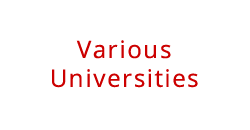Various Universities

In 2010, through referral, Quantum Plus was engaged separately by the London South Bank University, the University of Exeter and the University of Surrey. These Universities are recognised as being in the top quartile in terms of IT services in the UK University sector.
In 2010, the impact of the current economic environment presented new challenges to the higher education sector. Anticipated cuts along with competition over fewer students and a change in government are all increasing the pressure to deliver real cost savings whilst maintaining service levels. Therefore IT departments were under pressure to deliver efficiency savings to meet the challenge of reducing costs without impacting services.
Although London South Bank University, University of Exeter and University of Surrey had access to comparison benchmark data, they were looking for more insight into the cost of service delivery to enable the implementation of a programme of efficiency savings. To support this initiative they turned to Quantum Plus and our innovative ‘market compare’ offering.
The Quantum Plus market compare process enabled the Universities to understand the true cost of delivering key IS services such as service desk, field support, server support etc. and then make a market comparison to the cost of delivering these services in the private sector. This was achieved through workshops and data analysis. The approach takes into account key cost drivers such as service quality, service levels and service maturity.
The output was a report that highlighted cost deltas with recommendations, both strategic and tactical, to achieve similar cost levels and efficiencies comparable to market best practice.
A variety of recommendations were made to the Universities. These recommendations included but were not limited to;
- Suggested organisational changes
- Indications of process improvements
- Incorporation of non-IT managed services (and associated budget) to make cost savings
- Benchmark indications on key service provider contracts for further review and negotiation.
All the universities acknowledged that the process introduced great insight, identified new opportunities for efficiencies, and created stimulus for already identified efficiency projects as it provided supporting data.



